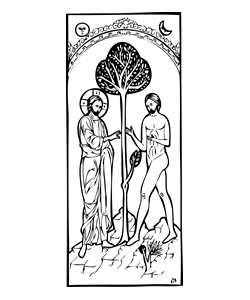|
|||
|---|---|---|---|
| This weekly bulletin insert complements the curriculum published by the Department of Christian Education of the Orthodox Church in America. This and many other Christian Education resources are available at http://dce.oca.org. | |||

The fourth chapter of the Book of Genesis includes the story of Cain and Abel. These sons of Adam and Eve make offerings to God. Abel, a keeper of sheep, brings a choice young animal. Cain, described as a "tiller of the soil" or farmer, offers grain. God accepts Abel's gift, but not Cain's. Though no reason is given for the choice God makes, He sees the anger it causes in Cain. God gives him what seems to be both a reassurance and a warning: "If you do well, will you not be accepted? And if you do not do well, sin is crouching at the door; its desire is for you, but you must master it." God is telling Cain that everything depends on his righteousness. But sin does get the better of Cain. He kills Abel and then faces the inescapable question from God: "Where is your brother Abel?" God knows perfectly well where Abel is, just as He knew the answer to a similar question He posed to Adam earlier in Genesis: "Where are you?" Like Adam, Cain fails to give an honest answer. He lies, and speaks defiantly and disrespectfully: "I do not know; am I my brother's keeper?" Cain knows that his "brother's keeper" is exactly what God expects him to be, but he has fallen away from what God expects. His answer is a kind of self-defense, as if to say that God's expectations are unreasonable or unreachably high for a mere human being. God announces Cain's punishment for the sin of murder, and Cain bewails his fate, saying, "I shall be a fugitive and a wanderer on the earth, and whoever finds me will slay me." But God's mercy is with him, even after his terrible deed. The Lord puts a mark on him, "lest any who came upon him should kill him." Though the "mark of Cain" is often misunderstood as a sign showing Cain as a murderer, it is in fact a sign of God's protection. In the next verses of Genesis, the author has fused together two Biblical sources. So now rather than being one of only three people on earth (Cain, Adam and Eve) Cain is married and has a son called Enoch. Genesis names several generations of Enoch's offspring, ending with Lamech.
If Cain murdered, Lamech murders with boastful pride. He says to his wives, "Hearken to what I say. I have slain a man for wounding me, a young man for striking me." The author wants to show that mankind is becoming increasingly evil. The disobedience to God's law that began with Adam and Eve increased with Cain, and has now become truly ugly with Lamech. Yet the world can be saved if there is one righteous person willing to obey God. In the next chapter of Genesis, God finds that man and instructs him to build an ark. He is Noah, the son of none other than Lamech. |
|||
